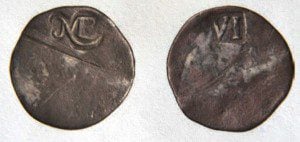I’m an admirer of C.S. Lewis, who has given me plenty of delight and insight over the years. And I’m also a fan of the band Sixpence None the Richer (if you only know them from “Kiss Me,” you’re missing out). But I’ve come to dislike the nexus of the two — the Lewis analogy from which the band took its name.
Here’s the passage in question, from Lewis’ Mere Christianity:
Every faculty you have, your power of thinking or of moving your limbs from moment to moment, is given to you by God. If you devoted every moment of your whole life exclusively to His service you could not give Him anything that was not in a sense His own already. So that when we talk of a man doing anything for God or giving anything to God, I will tell you what it is really like. It is like a small child going to his father and saying, “Daddy, give me sixpence to buy you a birthday present.” Of course, the father does, and he is pleased with the child’s present. It is all very nice and proper, but only an idiot would think that the father is sixpence to the good on the transaction. …
That’s a charming illustration, and it’s partly true — which is to say it’s also partly not true.
The problem can be seen once Lewis moves from the fuzzy generality of “giving anything to God” to the specific analogy of the child’s sixpence. What would it mean, actually, to try to give sixpence to God?
 I don’t mean a figurative or an allegorical sixpence here, with the coins symbolizing good works or our attempts at righteousness or some other such abstraction. I mean the actual sum of sixpence in cash money.
I don’t mean a figurative or an allegorical sixpence here, with the coins symbolizing good works or our attempts at righteousness or some other such abstraction. I mean the actual sum of sixpence in cash money.
Would would it mean, concretely, to give money directly to God?
Well, there’s the offering plate, for one thing. Many churches speak of giving our gifts to God when they pass that plate, and one never gets the sense that those churches collecting those offerings consider themselves “none the richer” for having received them. The truth is that they need that money, even if it’s only sixpence. The roof leaks, the boiler isn’t getting any younger, and if there’s any left over after that there’s also some ministry type stuff that needs doing.
But putting money into the offering plate really isn’t the same as giving the money directly to God. You’re giving that money to the church, and to say that’s the same thing might again be partly true, but partly not.
According to the Bible, though, it is possible to give money directly to God. This is something that’s mentioned — commanded, actually — in every part of the scriptures, in the law, the prophets, the wisdom literature, the Gospels and the epistles. Whoever gives to the poor lends to God, Proverbs says. “Just as you did it to one of the least of these,” Jesus said, “you did it to me.”
We can give our sixpence directly to God by giving our sixpence to the poor.
Lewis seems to have forgotten that here. (He often seems to have forgotten that, as the poor don’t show up a whole lot in his writing — certainly not with the frequency and priority that they do in the Bible.)
And when we give that sixpence to the poor only an idiot would try to argue that the poor are not sixpence to the good on the transaction. They need that money. That’s what being poor means.
What that suggests, of course, is that God needs your contribution — whether it be sixpence or five loaves and two fishes. It means that God, right now, is suffering for the lack of it. And it means that God, upon receiving it, will be sixpence to the good on the transaction.
















